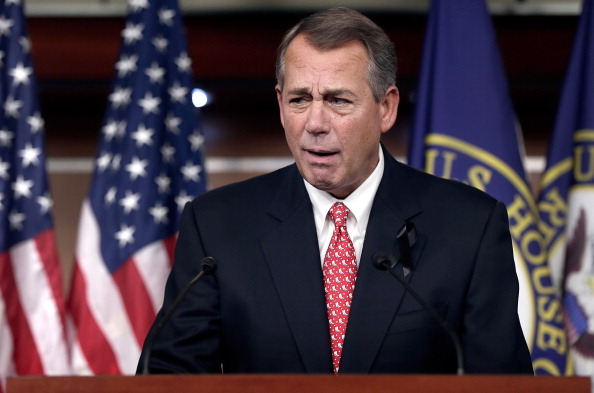Personal Wealth Management /
Budgetary Surprises
Congress has seemingly reached a budget deal—but what does this mean for investors?
Is that a look of surprise on House Speaker John Boehner’s face regarding a potential budget deal? Source: Win McNamee/Getty Images.
Surprise, surprise, surprise! A bipartisan agreement may have Congress finishing a budget deal before the last minute. We know! What a shocking plot twist for the 113th Congress—the most do-nothing legislative body in modern American history. (That’s not really intended as a criticism.) To some, this deal may be especially surprising given the recently rancorous history of budget and debt ceiling debates, and the seeming penchant in Washington for last-minute deal making. Just two months ago, we had a 17-day government shutdown and an 11th hour debt ceiling increase. But here we are, weeks before the January 15 “deadline,” and a bill is up for a vote. Most in the media seemingly think this is grounds for cautious optimism—a positive surprise from politicians! In our view, this move is neither negative nor positive for markets—it’s actually politics as usual and amounts to, more or less, just noise.
House Budget Committee Chairman Paul Ryan (R-WI) and his Senate counterpart, Patty Murray (D-WA), have agreed on a budget which will, if approved by Congress, secure government funding for the next two years—and sidestep another potential government shutdown in January. The proposed budget will lessen the impact of the sequester—the schedule of reduced government spending growth agreed to in 2011’s Budget Control Act. The sequester would have capped discretionary (i.e., non-entitlement) government spending at $967 billion in fiscal 2014. The new deal bumps it to $1.015 trillion, with similar small increases to projected spending the following year. The increase in on-budget spending is to be financed by various increases in fees, so proponents claim it still reduces the deficit. Measures include raising TSA fees, raising some federal employee contributions and modifying the cost-of-living adjustment for some military retiree pensions.
While Ryan and Murray have come to an agreement on certain issues, both admit the proposal doesn’t include any material changes they’d like—like entitlement reforms (Republicans) or unemployment benefits extensions for the long-term unemployed (Democrats). It is decidedly not the mythical “grand bargain”—the Loch Ness monster of government finance—but this is about as unsurprising as is possible.
Whatever the components, most in the punditry seem to think the announcement of a potential budget deal is an overwhelming positive for markets as it seemingly removes some hot debate and a shutdown from the table. This seems vastly overstated. The deal isn’t necessarily a negative either—it just is. There have been now 18 government shutdowns historically, and there is no evidence they’re a big threat to stocks. Similarly, Congress has been bickering about budgets for months and it hasn’t been a big deal for stocks, so that they may have come to an agreement shouldn’t mean much either. Even those fearing the sequester’s cuts would have a hard time discerning a threat to stocks should it live on. After all, those fearing the sequester’s supposedly loathsome cuts may be overlooking the fact the economy has grown and stocks have posted a banner year throughout its life—with the US leading. The mitigation of perceived negatives that weren’t a meaningful drag to begin with is not a huge positive.
The debt ceiling is not addressed in this legislation, which some see as a flaw considering the Treasury projects needing a hike as soon as February 2014. However, like the budget debate, we’d argue the feckless ceiling is immaterial. When the ceiling debate arrives, Congress will likely just raise it again—like they did in October, and the time before that, and the time before that, and the time before that ... (They’ve raised it more than 100 times already—you catch our drift.) And even if they delay and squabble, the risk of default is incredibly remote.
Besides, the media’s surprise at the early deal seemingly misunderstands what this is—politics as usual, not a rare example of bipartisanship. Eleven months from now there is a little matter called the midterm elections, and if politicians from both parties agree on anything, it’s that elections are really, really important. They are the only true political deadline. The common perception (which may or may not prove accurate) is October’s shutdown scarefest and heated debate were not good for the Republicans. The website and “you can keep your plan” debacles involving the Affordable Care Act’s implementation are similarly seen as a threat to Democrats seeking reelection. They probably presume finger-pointing and fist-shaking would be less popular than a seemingly rational bipartisan budget. Cue the across-the-aisle handholding and “Kumbaya” singing. This is classic politics, folks.
The bill is not yet a done deal. The full House and Senate will vote on the draft over the next few days, prior to going on their holiday break. Despite an urging from President Obama to pass the bill, the proposal has already been met with some vocal opposition from Republicans and Democrats alike. Maybe the bill passes the House, Senate and President’s desk in a jiff, or perhaps it dies somewhere along the way. But either way, the market impact of political cooperation and its mirror opposite, acrimony, is often overstated.
If you would like to contact the editors responsible for this article, please message MarketMinder directly.
*The content contained in this article represents only the opinions and viewpoints of the Fisher Investments editorial staff.
Get a weekly roundup of our market insights
Sign up for our weekly e-mail newsletter.

You Imagine Your Future. We Help You Get There.
Are you ready to start your journey to a better financial future?

Where Might the Market Go Next?
Confidently tackle the market’s ups and downs with independent research and analysis that tells you where we think stocks are headed—and why.






